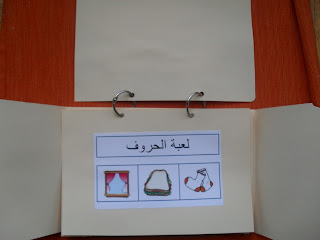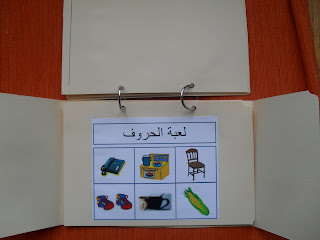Assalamu alaikum,
I was watching this video (which also contains the instructions for how to use these games) and wanted to do the same game but for learning/practicing the Arabic alphabet and knowing the sound each letter makes. I modified the game to suit toddlers but also made a game for kindergarteners as well. These are easy Arabic Alphabet Phonics games that help toddlers increase vocabulary, learn the sounds the letters make, and help them with picture matching skills insha'Allah. For our learning environment, I put our games into a tot sized folder to make the boards easy to work with insha'Allah.
This is the tot version of the game
The game with all game pieces shown. I laminated all of the game pieces so that they would have a better chance at withstanding frequent handling insha'Allah (smile).
For toddlers, I put four cards out, one of which does not belong. After showing the child how to use the game, the child is invited to say the name of the picture and what letter it starts with and then place the correct picture on the board. For younger toddlers they are invited to simply match the picture cards with the pictures on the board.
The activity almost completed
When the child is done, he/she simply flips the board over to reveal another board to play with insha'Allah.
As the child's skill and proficiency increase insha'Allah, he/she moves on to play with boards that have six pictures.
This is another six picture game board
In Pre-K and Kindergarten, as you saw in the video, this game can be played in pairs insha'Allah. So, I also made a version for that age group as well alhamdulillah.
This is one of the kindergarten boards and some of the letter pieces. Kindergarteners match the beginning letter sound to each picture. There are two different boards in the file and the complete Arabic Alphabet. I've also included the name of the game in English.
These games are quite easy to make at home and you can change them to fit your child's learning needs insha'Allah. Here is the file used to make the games pictured here (it contains all boards and pieces insha'Allah). Here is an Arabic pronunciation chart for all of the pictures (keep in mind that I'm not the best at writing Arabic in English so I may be a little off on some words but I hope not...*smile*).
Enjoy insha'Allah!










mashaAllah I can't wait to try this out once my daughter knows all her arabic letters and sounds inshaAllah :)
ReplyDeleteassalamu alaikum,
ReplyDeletedear sis Eva and jazakillahu khayr. Even if your daughter does not know all of her Arabic letters and sounds you can invite her to match the picture cards to the pictures on the game boards (if that isn't too easy for her). At the moment, I don't recall your daughters age but this activity can be used with toddlers around 18 months old and up insha'Allah. I hope she enjoys the game insha'Allah (smile).
Assalaamu'alaykum dear sis,
ReplyDeleteMashaa Allaah, may Allaah reward you for all the activities you have done here, subhanallaah!
Sis, this activity would be for a child who knows arabic, right?
I was thinking of teaching my children the arabic letters like phonics, and not really need them to know the names of the alphabets. Is this a good idea? Do you have any ideas how to make it easy and interesting? My son just won't sit down and read after me.. he likes games, and activities, inshaa Allaah!
Jazzakillaahu khayran kathira!
Waalaikum assalam wa rahmatullaah,
ReplyDeleteWa iyaki. Alhamduillaah for whatever benefit this blog may bring and jazakillaahu khayr for your kind words dear sis.
For teaching children phonics, generally the child would have some letter knowledge (i.e. know the names of the letters) because phonics instruction is where children are taught how to use letter-sound relationships to read and to spell words. It helps the child to know the letters (i.e. their names) because often the letters make the sound of their name.
If, for example, the child does not know the letter taa (i.e. its name, what it looks like) and they are taught the sound it makes, it may be a bit difficult for them to associate that sound to anything. There needs to be a combination of knowledge present for the child to have the best chance of mastering the material...waallaahu a'lam.
I hope I have understood you correctly insha'Allaah.
As for not wishing to sit down and read after you then alhamdulillaah this is completely normal *smile*. At this young age, instruction is achieved through games and fun activities like you mentioned. The game pictured above is the type of game I would place in one of my learning stations/centres or use as an informal assessment tool also. It would also be used as a teaching tool but not the primary one.
Does your son speak Arabic? If so then this activity should not prove too difficult for him b/c the pictures show things that children encounter very frequently in their environment insha'Allaah. If your son does not speak Arabic then this could help build is Arabic vocabulary insha'Allaah.
Did you wish to have ideas for this game specifically or for teaching phonics for the Arabic alphabet in general?
Assalaamu'alaykum sis,
ReplyDeleteJazzakillaahu khayran kathira for your quick response, mashaa Allaah!
My son doesn't speak arabic, and neither do I. And neither does his father..
I was thinking more of the Montessori method of teaching phonics first, whereby they don't teach the child the name of the letter. Just the picture of the letter, and the sound. I hope you know what I mean.
When it comes to arabic, I am wondering if it is ok to use the same method?
Like, Ah, and Buh, Tuh, Thh, Hhh.. or something, I wonder if I am making sense. *grin*
Waalaikum assalam wa rahmatullaah,
ReplyDeleteI see, I see. Tayyib....this is one aspect of Montessori that I do not use in my classroom (i.e. how Montessori teaches reading) personally but that does not mean that I discount its effectiveness. The system I use in my classroom has produced such wonderful results that I am partial to it *smile*.
As far as using the Montessori method to teach Arabic I do not know the answer to this question. You may wish to contact the AMI (American Montessori Institute) and perhaps they might be able to answer that question insha'Allaah.
This is a good question and I am now curious to know myself. There is a Montessori school in KSA and I wonder if they use the Montessori method of teaching reading in Arabic?.....
jazakillaahu khayr dear sis
assalam u alaikuim wa rahmatullah
ReplyDeleteJazakhAllah Khayrun for your blog is brill especially the arabic part.
Although Alhamdulillah I have taught my daughter basic arabic and need to improve upon mine you have provided me with fab ideas.
JazakhAllah Khayrunxxx
Salamu alaykum! This games looks amazing mashaAllah. I am trying to download but app box is not working. As per your latest post if you could help me download it would be so helpful. JazakiAllah chair :)
ReplyDelete